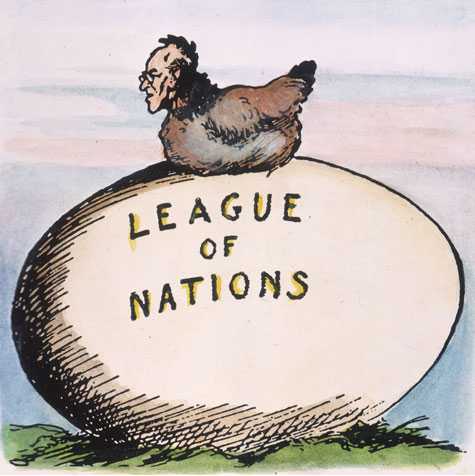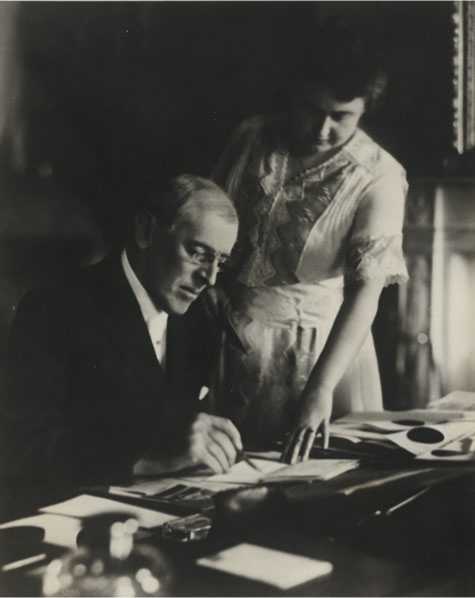When Wilson returned from France, he finally directed his attention to the task of winning public approval of his handiwork. A large majority of the people probably favored the League of Nations in principle, though few understood all its implications or were entirely happy with every detail. Wilson had persuaded the Allies to accept certain changes in the original draft to mollify American opposition. No nation could be forced to accept a colonial mandate, and “domestic questions” such as tariffs, the control of immigration, and the Monroe Doctrine were excluded from League control.
Many senators found these modifications insufficient. Even before the peace conference ended, thirty-seven Republican senators signed a manifesto, devised by Henry Cabot Lodge of Massachusetts, opposing Wilson’s League and demanding that the question of an international organization be put off until “the urgent business of negotiating peace terms with Germany” had been completed. Wilson rejected this suggestion icily. Further alterations were out of the question. “Anyone who opposes me. . . I’ll crush!” he told one Democratic senator. “I shall consent to nothing. The Senate must take its medicine.” Thus the stage was set for a monumental test of strength between the president and the Republican majority in the Senate.
Partisanship, principle, and prejudice clashed mightily in this contest. A presidential election loomed. Should the League prove a success, the Republicans wanted to be able to claim a share of the credit, but Wilson had refused to allow them to participate in drafting the document. This predisposed all of them to favor changes. Politics aside, genuine alarm at the possible sacrifice of American sovereignty to an international authority led many Republicans to urge modification of the League covenant, or constitution. Personal dislike of Wilson and his high-handed methods motivated others. Yet the noble purpose of the League made many reluctant to reject it entirely. The intense desire of the people to have an end to the long war made Republican leaders hesitate before voting down the Versailles Treaty, and they could not reject the League without rejecting the treaty.
Wilson could count on the Democratic senators almost to a man, but he had to win over many Republicans to obtain the two-thirds majority necessary for ratification. Republican opinion divided roughly into three segments. At one extreme were some dozen “irreconcilables,” led by the shaggy-browed William E. Borah of Idaho, an able and kindly person of progressive leanings but an uncompromising isolationist. Borah claimed that he would vote against the League even if Jesus Christ returned to earth to argue in its behalf, and most of his followers were equally inflexible. At the other extreme stood another dozen “mild” reservationists who were in favor of the League but who hoped to alter it in minor ways, chiefly for political purposes. In the middle were the “strong” reservationists, senators willing to go along with the League only if American sovereignty were fully protected and if it were made clear that their party had played a major role in fashioning the final document.
Senator Lodge, the leader of the Republican opposition, was a haughty, rather cynical, intensely partisan individual. He possessed a keen intelligence,

Despite Wilson's serving as mother hen, the League of Nations never hatched.
A mastery of parliamentary procedure, and, as chairman of the Senate Foreign Relations Committee, a great deal of power. Although not an isolationist, he had little faith in the League. He also had a profound distrust of Democrats, especially Wilson, whom he considered a hypocrite and a coward. The president’s pious idealism left him cold. While perfectly ready to see the country participate actively in world affairs, Lodge insisted that its right to determine its own best interests in every situation be preserved. He had been a senator since 1893 and an admirer of senatorial independence since early manhood. When a Democratic president tried to ram the Versailles Treaty down the Senate’s throat, he fought him with every weapon he could muster.
Lodge belonged to the strong reservationist faction. His own proposals, known as the Lodge Reservations, fourteen in number to match Wilson’s Fourteen Points, limited U. S. obligations to the League and stated in unmistakable terms the right of Congress to decide when to honor these obligations. Some of the reservations were mere quibbles. Others, such as the provision that the United States would not endorse Japan’s seizure of Chinese territory, were included mainly to embarrass Wilson by pointing out compromises he had made at Versailles. The most important reservation applied to Article Ten of the League covenant, which committed signatories to protect the political independence and territorial integrity of all member nations. Wilson had rightly called Article Ten “the heart of the Covenant.” One of Lodge’s reservations made it inoperable so far as the United States was concerned “unless in any particular case the Congress. . . shall by act or joint resolution so provide.”
Lodge performed brilliantly, if somewhat unscrupulously, in uniting the three Republican factions behind his reservations. He got the irreconcil-ables to agree to them by conceding their right to vote against the final version in any event, and he held the mild reservationists in line by modifying some of his demands and stressing the importance of party unity. Reservations—as distinct from amendments—would not have to win the formal approval of other League members. In addition, the Lodge proposals dealt forthrightly with the problem of reconciling traditional concepts of national sovereignty with the new idea of world cooperation. Supporters of the League could accept them without sacrifice of principle. Wilson, however, refused to agree. “Accept the Treaty with the Lodge reservations?” the president snorted when a friendly senator warned him that he must accept a compromise. “Never! Never!”
This foolish intransigence seems almost incomprehensible in a man of Wilson’s intelligence and political experience. In part his hatred of Lodge accounts for it, in part his faith in his League. His physical condition in 1919 also played a role. At Paris he had suffered a violent attack of indigestion that was probably a symptom of a minor stroke. Thereafter, many observers noted small changes in his personality, particularly increased stubbornness and a loss of good judgment. Instead of making concessions, the president set out early in September on a nationwide speaking crusade to rally support for the League. In three weeks, Wilson traveled some 10,000 miles by train and gave forty speeches, some of them brilliant. But they had little effect on senatorial opinion, and the effort drained his last physical reserves. On September 25, after an address in Pueblo, Colorado, he collapsed. The rest of the trip had to be canceled. A few days later, in Washington, he suffered a severe stroke that partially paralyzed his left side.
For nearly two months the president was almost totally cut off from affairs of state, leaving supporters of the League leaderless while Lodge maneuvered the reservations through the Senate. Gradually, popular attitudes toward the League shifted. Organized groups of Italian, Irish, and German Americans, angered by what they considered unfair treatment of their native lands in the Versailles Treaty, clamored for outright rejection. The arguments of the irreconcilables persuaded many citizens that Wilson had made too sharp a break with America’s isolationist past and that the Lodge Reservations were therefore necessary. Other issues connected with the reconversion of society to a peacetime basis increasingly occupied the public mind.

This 1920 photograph of Wilson, with his second wife, Edith, was the first taken since his stroke.
A coalition of Democratic and moderate Republican senators could easily have carried the treaty. That no such coalition was organized was Wilson’s fault. Lodge obtained the simple majority necessary to add his reservations to the treaty merely by keeping his own party united. When the time came for the final roll call on November 19, Wilson, bitter and emotionally distraught, urged the Democrats to vote for rejection. “Better a thousand times to go down fighting than to dip your colors to dishonorable compromise,” he explained to his wife. Thus the amended treaty failed, thirty-five to fifty-five, the irreconcilables and the Democrats voting against it. Lodge then allowed the original draft without his reservations to come to a vote. Again the result was defeat, thirty-eight to fifty-three. Only one Republican cast a ballot for ratification.
Dismayed but not yet crushed, friends of the League in both parties forced reconsideration of the treaty early in 1920. Neither Lodge nor Wilson would yield an inch. Lodge, who had little confidence in the effectiveness of any league of nations, was under no compulsion to compromise. Wilson, who believed that the League was the world’s best hope, did have such a compulsion. Yet he would not compromise either, and this ensured the treaty’s defeat.
Wilson’s behavior is further evidence of his physical and mental decline. Had he died or stepped down, the treaty, with reservations, would almost certainly have been ratified. When the Senate balloted again in March, half the Democrats voted for the treaty with the Lodge Reservations. The others, mostly southern party regulars, joined the irreconcilables. Together they mustered thirty-five votes, seven more than the one-third that meant defeat.
•••-[Read the Document Henry Cabot Lodge's Objections to the Treaty of Versailles at www. myhistorylab. com




 World History
World History









